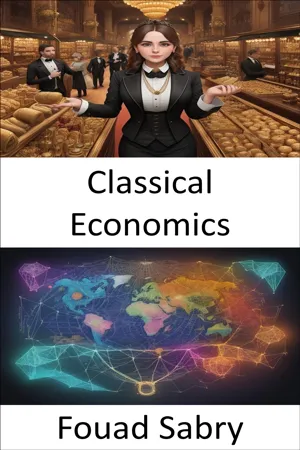
Classical Economics
Unlocking the Wealth of Nations, a Journey Through Classical Economics
- English
- ePUB (mobile friendly)
- Available on iOS & Android
Classical Economics
Unlocking the Wealth of Nations, a Journey Through Classical Economics
About this book
What is Classical Economics
There is a school of thought in political economy known as classical economics, classical political economy, or Smithian economics. This school of thought flourished, particularly in Britain, in the latter half of the 18th century and the early to middle of the 19th century. It is generally agreed that Adam Smith, Jean-Baptiste Say, David Ricardo, Thomas Robert Malthus, and John Stuart Mill are the most influential theorists in this school of thought. The theory of market economies, which was developed by these economists, describes market economies as systems that are generally self-regulating and are regulated by natural rules of production and exchange.
How you will benefit
(I) Insights, and validations about the following topics:
Chapter 1: Classical economics
Chapter 2: David Ricardo
Chapter 3: Labor theory of value
Chapter 4: Piero Sraffa
Chapter 5: Cost-of-production theory of value
Chapter 6: Say's law
Chapter 7: Theory of value (economics)
Chapter 8: Maurice Dobb
Chapter 9: Law of value
Chapter 10: Prices of production
Chapter 11: Tendency of the rate of profit to fall
Chapter 12: Criticism of Marxism
Chapter 13: Ronald L. Meek
Chapter 14: Schools of economic thought
Chapter 15: Ricardian economics
Chapter 16: Ricardian socialism
Chapter 17: Anwar Shaikh (economist)
Chapter 18: Perspectives on capitalism by school of thought
Chapter 19: An Essay on Marxian Economics
Chapter 20: Marxian economics
Chapter 21: A History of Economic Thought
(II) Answering the public top questions about classical economics.
(III) Real world examples for the usage of classical economics in many fields.
(IV) Rich glossary featuring over 1200 terms to unlock a comprehensive understanding of classical economics. (eBook only).
Who will benefit
Professionals, undergraduate and graduate students, enthusiasts, hobbyists, and those who want to go beyond basic knowledge or information for any kind of classical economics.
Frequently asked questions
- Essential is ideal for learners and professionals who enjoy exploring a wide range of subjects. Access the Essential Library with 800,000+ trusted titles and best-sellers across business, personal growth, and the humanities. Includes unlimited reading time and Standard Read Aloud voice.
- Complete: Perfect for advanced learners and researchers needing full, unrestricted access. Unlock 1.4M+ books across hundreds of subjects, including academic and specialized titles. The Complete Plan also includes advanced features like Premium Read Aloud and Research Assistant.
Please note we cannot support devices running on iOS 13 and Android 7 or earlier. Learn more about using the app.
Information
Table of contents
- Chapter 1: Classical economics
- Chapter 2: David Ricardo
- Chapter 3: Labor theory of value
- Chapter 4: Piero Sraffa
- Chapter 5: Cost-of-production theory of value
- Chapter 6: Say's law
- Chapter 7: Theory of value (economics)
- Chapter 8: Maurice Dobb
- Chapter 9: Law of value
- Chapter 10: Prices of production
- Chapter 11: Tendency of the rate of profit to fall
- Chapter 12: Criticism of Marxism
- Chapter 13: Ronald L. Meek
- Chapter 14: Schools of economic thought
- Chapter 15: Ricardian economics
- Chapter 16: Ricardian socialism
- Chapter 17: Anwar Shaikh (economist)
- Chapter 18: Perspectives on capitalism by school of thought
- Chapter 19: An Essay on Marxian Economics
- Chapter 20: Marxian economics
- Chapter 21: A History of Economic Thought
- Epilogue
- Appendix
- About the Author